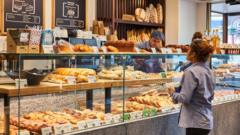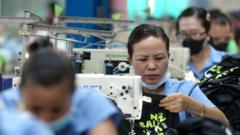Paris Baguette, a leading Korean bakery brand, seeks to redefine the perception of baked goods with a robust expansion strategy and a focus on combining traditional flavors with global appeal, despite facing economic challenges.
Global Expansion of Paris Baguette: Redefining Bakery Culture Beyond Borders

Global Expansion of Paris Baguette: Redefining Bakery Culture Beyond Borders
The Korean bakery chain Paris Baguette is on a mission to revolutionize global bakery culture with plans for significant international growth.
In the bustling streets of global urban centers, the aroma of freshly baked pastries wafts through the air, marking the rise of an innovative contender in the bakery industry: Paris Baguette. While the name evokes a sense of French sophistication, the brand proudly announces its identity as a Korean enterprise. "Croissants and other baked items do not belong to a single culture; they are universal," asserts Jin-soo Hur, the president and chief executive of SPC Group, which owns Paris Baguette.
Established as a small family-owned bakery nearly 80 years ago, SPC has evolved into a powerhouse within South Korea's bakery scene, boasting $5.6 billion in sales last year. Since its inception in 1988, Paris Baguette has expanded its footprint, operating 4,000 locations across 14 countries, with growing ambitions for its international market. The ambitious path forward includes a target of over 1,000 new branches by 2030, a significant portion of which will be in the U.S. To support this expansion, the chain is developing its largest overseas production facility in Texas, set to open in 2027.
Beyond the product, Paris Baguette intertwines culture with food, establishing partnerships with renowned sports teams like England’s Tottenham Hotspur. This strategic move allows the brand to bond with diverse audiences, particularly as South Korean football star Son Heung-min takes the lead on the Tottenham squad. "Food is culture, and sports create communal experiences," notes Hur.
Yet, the bakery landscape in Asia is evolving rapidly. The increasing demand for convenient options has led many bakeries to innovate, blending traditional flavors with modern trends. Paris Baguette is no exception. The company has opened a halal-certified facility in Malaysia to cater to various markets around Southeast Asia and the Middle East, showcasing a willingness to adapt to regional tastes.
However, the reliance on large-scale production methods, such as using frozen dough, sparks debate over quality. Noted culinary expert Saveria Busato points out that while mass production makes bread more accessible, it may not capture the quality or authenticity offered by artisanal bakeries. A taste test revealed discrepancies: while traditional Asian bread delights with unique flavors and textures, mass-produced croissants may lack the craftsmanship of their smaller counterparts.
Amidst these challenges, Paris Baguette is also confronted by the global economy's constraints, especially with rising inflation in the U.S. Yet for Hur, success transcends mere profit margins. "We are not just focused on financial gain. We aspire to reshape the global bread culture, benefiting not only South Korea but also diverse communities worldwide," he asserts. Embracing this ethos, Paris Baguette is poised to navigate the complexities of expansion, continually adapting and redefining bakery culture on a global scale.





















